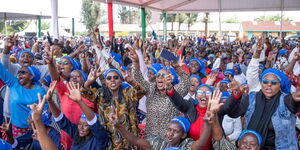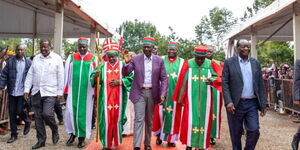Kimilili MP Didmus Barasa has explained his statement in which he accused President Uhuru Kenyatta of exerting undue authority during the Jubilee Parliamentary Group Meeting at State House on June 2.
In a Tweet later the same day, Barasa had stated “The meeting went on with three AK 47s on the table, nonetheless, we tried to lift our hands up but the chairman gave us a blind eye.”
Speaking to Kenyans.co.ke, he explained why he used the symbolism of the AK47s at the State House meeting.
The MP stated that the tone of the meeting was tense and that the President seemed to have his agenda set on intimidating the MPs into passing the resolutions.
“When you have a situation where the President arrives, reads the riot act, calls you stupid and then says he has unsheathed his sword, what does that mean?” Barasa spoke on the phone.
He added that none of the MPs were given a chance to speak as was the formality in previous PG meetings.
Jubilee Party Secretary-General opened the meeting and welcomed Deputy President William Ruto who paved the way for Uhuru to give his remarks which had been noted on a piece of paper.
A showdown had been expected but DP Ruto’s remarks were well calculated to not spark any drama.
“He did not talk about anything in particular, he just said that the members had been anticipating the meeting and were excited that it had finally been convened to listen to your wise counsel and direction,” another source intimated about Ruto’s speech.
Professor Makau Mutua questioned why the MPs did not stage a walkout if the meeting was unsatisfactory.
“But you could’ve led a mass walkout the way Kipchumba Murkomen did at the BBI rally in Meru. You could also have stood up, chanted, and shouted in unison with fellow rebels,” he stated.
Barasa told Kenyans.co.ke that even though they disagreed with President Kenyatta, they refrained from walking out of the meeting out of respect.
“Because he is the head of state, we felt we should give him that respect so that’s why we did not stage a walkout.
“You know at times part of the principles of leadership is to respect other leaders even if you differ on opinions,” Barasa added.












